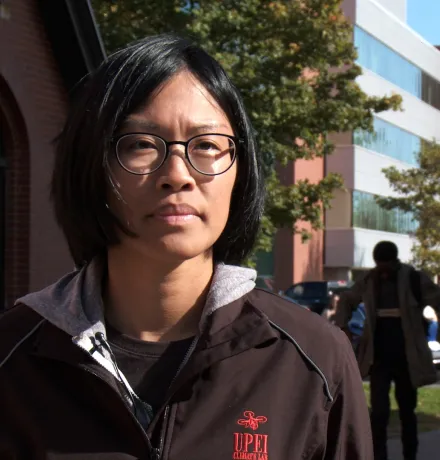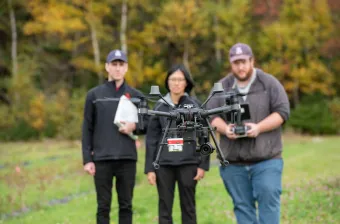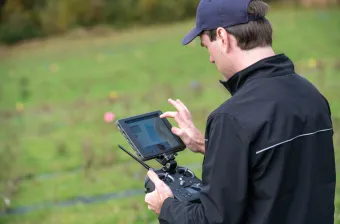The need to act on the worldwide climate crisis is urgent and immediate. Temperatures and global sea levels continue to rise, and communities are experiencing more frequent extreme weather events such as hurricanes and wildfires. UPEI’s Bachelor of Science in Applied Climate Change and Adaptation provides students with the opportunity to explore the challenges and solutions of this global issue. Organizations around the globe—corporate, nonprofit, governmental, and consulting—are committing to climate action, and are seeking qualified individuals with the specialized knowledge needed to combat this crisis with creative and effective solutions.
Build your adaptive capacity with the skills you need to develop climate smart solutions.
Climate Change Adaptation is the process of adjusting practices, structures, and ways of knowing to better cope with or create benefits from the changing climate. These processes can range from a farmer planting more drought-resistant crops, to a coastal community evaluating how best to protect its infrastructure from rising sea level. Climate change is already impacting societies and ecosystems around the world, and many impacts are expected to increase as global temperatures continue to rise.
“Adapting to the changes that are already underway, and preparing for future climate change, can help reduce the risks societies will face from climate change.”
The core programming delivered in Years 1 and 2 of the program are delivered at UPEI’s Charlottetown, PEI campus, while the experiential components and core programming of Years 3 and 4 of the program are delivered at the Canadian Centre for Climate Change and Adaptation located in St. Peter’s Bay, PEI.
Why Choose a Career in Climate Change?
If you’re looking to make a difference in how people, places, and ecosystems adjust to the new climate realities, the UPEI Bachelor of Science in Applied Climate Change and Adaptation is for you. Professionals in this field play an expanding, critical role in science, government, industry, and society and the scope for climate adaptation workers is consistently growing and diversifying. The International Labour Organization (ILO) predicts clean energy, environmental science, policy making, and planning sectors will create up to 24 million jobs in the next decade.
What can you do with a Bachelor of Science in Applied Climate Change and Adaptation?
Your career path depends on your interests! You could continue your education in a variety of areas, including UPEI’s Master of Climate Change degree or choose to go directly into an exciting career, including:
- climate modeller
- climate risk scientist
- policy analyst
- carbon market analyst
- renewable energy specialist
- environmental consultant
... and many others. Some example employers include:
- federal, provincial, and municipal governments
- local and international NGOs
- consulting firms
- research centres
- colleges and universities
A career in climate change and adaptation not only gives you the personal satisfaction of doing something meaningful, but it can give you a sense of being part of social and environmental progress.
Need more information about Applied Climate Change and Adaptation?
The personal information requested on this form is collected under Section 31(c) of the PEI Freedom of Information and Protection of Privacy Act. Read our Disclaimer.
Note: Current UPEI students should refer to Student Planning in myUPEI and the UPEI Academic Calendar governing their entry year, and speak to an academic advisor about course requirements. The course structure presented for this program is a recommended, unofficial progression for prospective students.
Note: As per Academic Regulation 1h, all undergraduate degree programs require successful completion of IKE-1040 and a Writing Intensive Course.
Year 1
ACC 1010 Introduction to PEI’s Living Climate Lab
ACC 1020 Introduction to Climate Adaptation Tools and Technologies
ACC 1040 Introduction to Climate Change
BIO 1010 Current Issues in Environmental Biology
CHEM 1110 General Chemistry I
MATH 1120 Calculus for Managerial, Social and Life Sciences; or 1910 Single Variable Calculus I
IKE 1040 Indigenous Teachings of Turtle Island
ENG 1010 Academic Writing
Two (2) electives
Year 2
ACC 2020 Climate Change Policy and Politics
ACC 2030 Indigenous Knowledge and Climate Change
CS 1910 Computer Science I
ACC 3050 Renewable Energy and Clean Technologies
CHEM 2020 Environmental Chemistry
ENV 2120 Earth’s Physical Environment
PHYS 2630 Climate Physics
STAT 1910 Introduction to Probability and Statistics
Two (2) electives
Summer Session
ACC 2160 Work Integrated Learning I
Year 3
ACC 3010 Global Climate Systems and Science
ACC 3020 Climate Futures and Modelling
ACC 3030 Climate Change Monitoring
ACC 3040 Climate Change Statistics in R
ACC 3090 Geographic Information Systems for Climate Change
ACC 3100 Climate Change Impacts on Biodiversity and Ecosystems
ACC 3120 Climate Change Policy in Canada
ACC 3140 Carbon Pricing Mechanisms
Two (2) electives
Summer Session
ACC 3160 Work Integrated Learning II
Year 4
ACC 4010 Climate Coastal Science
ACC 4020 Uncertainty and Probability in Climate Change
ACC 4040 Virtual Reality and Climate Change
ACC 4060 Measuring Your Carbon Footprint through Carbon Accounting
ACC 4070 Climate Extremes
ACC 4080 Climate Change Impacts and Adaptation
ACC 4120 International Climate Diplomacy
ACC 3060 Remote Sensing and Climate Change
ACC 4100 Precision Agriculture for Climate Resilience
One (1) elective
For a complete list of required courses for this program, refer to the UPEI Academic Calendar.
Agriculture from the air




PhD student Stephanie Arnold is helping farmers adapt to climate change by providing precision agriculture data from the air, thanks to the UPEI Climate Lab's fleet of drones.
Students may obtain a degree with a minor in Climate Change and Adaptation by successfully completing the following courses:
- ACC 1010 or ACC 1040
- ACC 1020
- ACC 2020
- ACC 2030
- ACC 3050, and
- Two of the ACC third-year or fourth-year courses excluding following courses:
- ACC 2160
- ACC 3160
- ACC 3040
- ACC 4020
- ACC 4040
- ACC 4070
The Bachelor of Science in Applied Climate Change and Adaptation is a 127 semester hour degree program.
High school graduate
Students can apply directly from high school to the UPEI Bachelor of Science in Applied Climate Change and Adaptation program. Admission will be capped at 40 students, with two of the 40 seats dedicated for Aboriginal students. Students of the program will progress as a cohort. All eligible first year candidates are considered for admission based on their average in Grade 12: academic English, academic Math, and two academic Sciences from the following list (academic Chemistry, academic Biology, academic Physics); one other Grade 12 academic subject; minimum overall average of 70% with no individual grade below 65%.
Applicants whose average in English, Math and two of Biology, Chemistry, or Physics, is 89% and above when final results for first semester grades are obtained will receive an "Early Offer" of admittance. All other applicants will be ranked.
In an effort to support a diverse cohort and build a program with global perspectives and global knowledge transfer opportunities, UPEI encourages applications from domestic and international students.
University applicant
Consideration will be given to students transferring into the program based on eligibility and enrolment numbers. University transfer students are subject to existing requirements for undergraduate admissions for the Faculty of Science.
University applicants attending or having attended a university must meet the same requirements as listed above, but can also complete the admission requirements by taking degree level courses.
Refer to the UPEI Academic Calendar for more information.
UPEI's undergraduate tuition is the second-lowest in the Atlantic region, and we offer millions of dollars in scholarships and awards.
Tuition
$7,630 per year, based on 30 credit hours ($763 per 3 credit course).
International students pay $9,040 per year in addition to full-time student tuition.
For a complete breakdown of part-time or full-time study as a student in the Faculty of Science, visit our Tuition and Fees page.
Scholarships
Ten (10) entrance scholarships of $2,000 are available for students of the Bachelor of Science in Applied Climate Change and Adaptation program.
Complete our inquiry form below to find out more.
The Roderick Stirling MacDonald Scholarships
UPEI has created fifteen (15) annual Roderick Stirling MacDonald Scholarships, valued at $1,000 each, for students in the Bachelor of Science in Applied Climate Change and Adaptation program.
- Ten (10) scholarships for first-year students
- Five (5) scholarships for students entering their third year
Students with an academic average of 80 per cent or higher in their previous year of study and a passion for improving the effects of climate change are eligible for these awards.
Read more about the Roderick Stirling MacDonald Scholarships
UPEI's interesting and unique programs are enhanced by our caring and supporting faculty, instructors, and staff.


